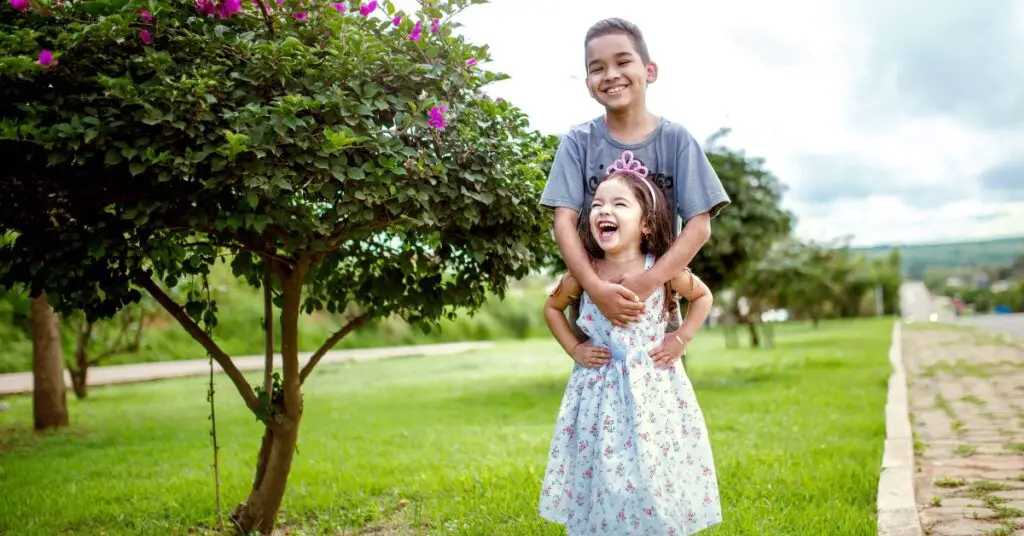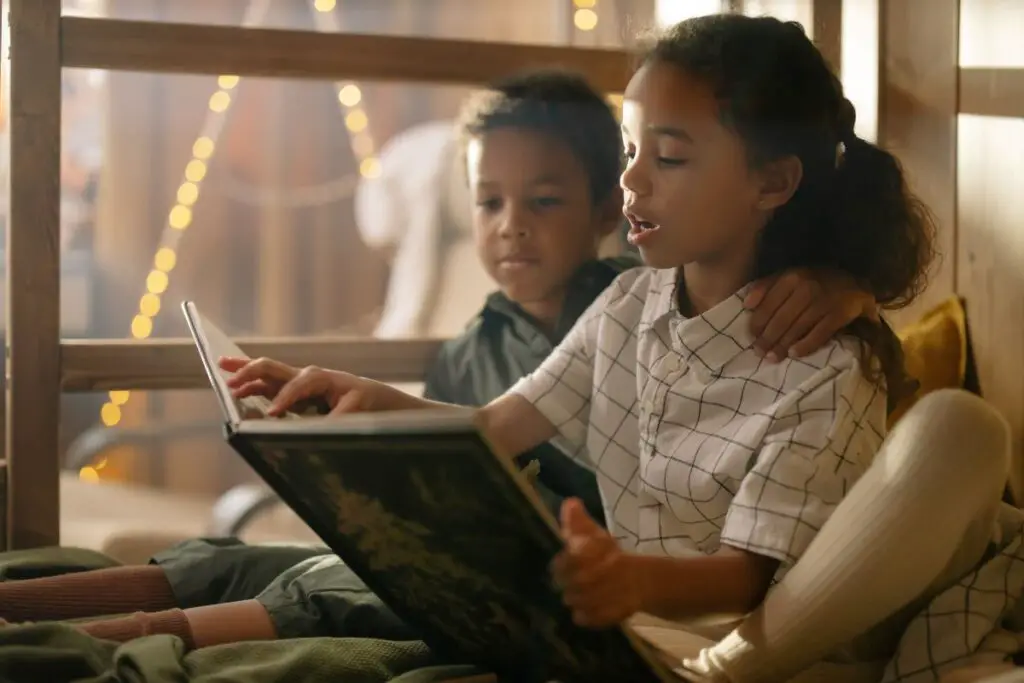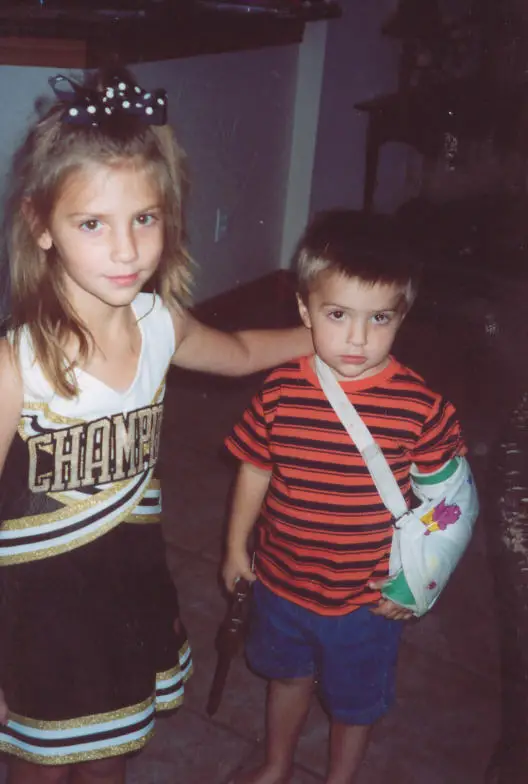Discover the Secret Language of Autism Sibling Love
Growing up with a sibling who has autism can be both challenging and rewarding. The unique experiences and dynamics that come with having a brother or sister on the autism spectrum can shape an individual’s perspective, resilience, and empathy in ways that are difficult to replicate elsewhere.
 From navigating social interactions to understanding sensory sensitivities, the dynamics between neurotypical and neurodiverse family members can mean a complex journey, but is typically one filled with sibling love.
From navigating social interactions to understanding sensory sensitivities, the dynamics between neurotypical and neurodiverse family members can mean a complex journey, but is typically one filled with sibling love.
Siblings of individuals with autism often develop a deep understanding of neurodiversity that extends far beyond their own family unit.
The family dynamics of having both neurodiverse and neurotypical sibling love can be extra gratifying for everyone.
Understanding Autism and its Impact on Families
Parents with both neurotypical and neurodiverse often find themselves navigating a unique set of circumstances as they strive to support their child with autism while also attending to the needs of other children. Siblings, in particular, may experience a range of emotions ranging from confusion to frustration to immense sibling love and acceptance.
One important aspect to recognize is the potential for increased resilience among siblings of autistic individuals. Growing up alongside a sibling with autism can foster empathy, patience, and adaptability in these siblings. They learn from an early age that connecting and communicating with their sibling may require alternative methods or tools, such as visual cues or sign language.
These experiences can give them invaluable skills that they carry into adulthood.
However, it is also crucial to acknowledge the challenges that come with being a sibling of someone on the autism spectrum.
Siblings may often feel overlooked or overshadowed by the level of attention given to their brother or sister with autism. This situation can lead them to develop feelings of sadness, anger, or even guilt for experiencing negative emotions towards their sibling’s condition.
In other words, it’s not always a case of profound sibling love…at least at first.
Overall, understanding autism’s impact on families requires recognizing both the unique opportunities for growth and connection that it presents as well as acknowledging the complex emotional dynamics that may arise within family relationships.
Sibling Relationships: Nurturing Connection and Understanding

Another key factor is education. Educating siblings about autism can help reduce misunderstandings and provide them with valuable insights into their brother or sister’s unique experiences.
This knowledge empowers them to approach situations with patience, empathy, and compassion. And, perhaps most important as part of sibling love, is support.
Parents can easily find age-appropriate resources such as books and videos that can explain basics such as the different subtypes of Autism Spectrum Disorder, its causes and risk factors, as well as the available treatment options. It’s also important to provide education that autism isn’t a disease and it isn’t something that is “curable.”
Developing shared activities can also foster connection between siblings. Finding hobbies or interests that both siblings enjoy creates opportunities for quality time together, building bonds beyond their individual roles as individuals affected by autism.
Emphasizing each sibling’s strengths is essential too. Celebrating their accomplishments – whether big or small – encourages a sense of positivity within the family unit while promoting self-esteem between all siblings.
Challenges Faced by Siblings: Emotions, Responsibilities, and Support
Being a sibling is a rewarding and special bond, but when one of your siblings has autism, it comes with its own set of family dynamics.
Siblings often experience a whirlwind of emotions, ranging from love and compassion to frustration and guilt.
It can be tough for them to understand why their sibling may behave differently or struggle with social interactions. This emotional rollercoaster can sometimes leave them feeling isolated or misunderstood, as they navigate both their own emotions and how to support their sibling.
Responsibilities also play a significant role in the life of siblings with an autistic brother or sister. They may find themselves taking on additional responsibilities at home, such as helping with daily routines or advocating for their sibling’s needs.
These added responsibilities can sometimes create feelings of overwhelm or resentment, especially when they see their friends without these extra obligations.
However, it is crucial for siblings to recognize that even though their role may differ from others’, they still have an important impact on their family dynamic.
Support plays a vital role in helping siblings navigate the challenges that come with having a brother or sister on the autism spectrum. Building support systems within school communities and through counseling services can provide siblings with a safe space to express themselves, ask questions, and find solutions to common struggles.
Connecting with other individuals who are experiencing similar situations fosters understanding and empathy among siblings – reminding them that they are not alone in this journey.
Promoting Positive Interactions: Strategies for Siblings and Parents
When a sibling has autism, it is common for the family innerworkings to undergo significant changes. Siblings may experience mixed emotions of love, frustration, and confusion as they navigate their relationship with their autistic brother or sister.
Similarly, parents may find themselves juggling between providing the necessary support for their child on the spectrum and attending to the needs of their neurotypical children.
To promote positive interactions between siblings and parents in such situations, communication plays a crucial role.
Open and honest communication is key when addressing the challenges that arise within a family affected by autism. Parents should actively involve all members in discussions about autism-related matters so everyone feels heard and understood. Additionally, creating opportunities for siblings to express their thoughts and emotions through activities such as art therapy or journaling can be highly beneficial.
On the other hand, parents should also strive to educate themselves about neurodiversity and share this knowledge with all members of the family. Such an understanding fosters empathy, reduces misconceptions, and encourages acceptance among siblings.
Although supporting a child on the spectrum often requires extra attention from parents, it is essential that they also dedicate quality time to spend with their other children.
Planning designated moments—such as weekly outings or special activities—can help strengthen bonds between parent and all siblings while reassuring them that they are valued individuals within the family unit as well.
Celebrate Differences: Encouraging Acceptance and Appreciation
One of the most beautiful aspects of humanity is our diversity. Each person brings their own unique set of skills, talents, and experiences to the table.

When a sibling has autism, it can be easy for other family members to feel overwhelmed or even isolated. However, this is an opportunity for everyone involved to learn about and celebrate the differences that make each individual special.
By encouraging acceptance and appreciation within the family unit, children can develop a greater understanding and sibling love for one another.
It’s important not just for families but also for society as a whole to recognize that we all have challenges in different forms. By celebrating these challenges instead of hiding or being ashamed of them, we create an environment where everyone feels accepted and valued.
Embracing diversity means embracing each person’s unique background, abilities, perspectives, and even limitations.
By promoting acceptance and appreciation through education and dialogue, we can foster a more inclusive society that values every individual for who they are instead of what they lack or struggle with.
When children grow up in an environment filled with acceptance from their own family members, they will carry these values into their interactions with others outside the home.
Seeking Outside Help: Resources for Siblings of Autistic Individuals
When a sibling has Autism, it can be a unique journey for the entire family. While parents often seek outside help and support, siblings too can benefit from resources specifically designed to address their experiences and emotions.
Recognizing the need for specialized assistance, several organizations and programs have been created to provide support and guidance to siblings of individuals with Autism.
One such resource is Sibshops, which are workshops designed specifically for siblings of children with special needs. These workshops offer a safe space for siblings to engage in activities, share experiences, ask questions, and develop coping strategies.
Through interactive games, discussions, and educational presentations led by trained facilitators, Sibshops empower these siblings with knowledge about autism while fostering connections with others who understand their unique challenges.
Another valuable resource is online support groups tailored to the needs of siblings. In this digital age where connection transcends physical boundaries, virtual platforms like Facebook groups or dedicated websites can be incredibly helpful in providing an outlet for siblings’ thoughts and feelings.
These online communities allow participants to share stories, seek advice from peers who may have faced similar situations before finding solutions or simply find solace in knowing they are not alone on this journey.
By seeking outside help through resources dedicated to siblings of autistic individuals, these siblings can receive the emotional validation they need while developing valuable tools for navigating their own lives alongside their sibling’s autism diagnosis.
What Neurotypical Children Can Do to Foster Sibling Love
There are three key areas for supporting an individual with autism through sibling love. They include:
- Empathy and Acceptance
One of the most crucial things that siblings can do to support their siblings with autism is to practice empathy and acceptance. It is essential to understand that autism is a neurological condition and not a choice.People with autism often have different ways of expressing themselves, communicating, and behaving, which may not align with societal norms.
As a sibling, you can practice empathy by putting yourself in your brother or sister’s shoes and trying to see things from their perspective. By understanding their unique challenges and strengths, you can better communicate with them and develop a deeper sense of connection.
It is also essential to accept your sibling for who they are and celebrate their strengths and achievements, no matter how small they may seem. By providing a non-judgmental and accepting environment, you can help your sibling build self-confidence and develop a positive self-image.
- Effective Communication
Effective communication is a critical component of building strong relationships with people with autism. However, communication can be a challenge for individuals with autism, who may have difficulty understanding nonverbal cues or may struggle with verbal expression.As a sibling, you can use various communication strategies to help your brother or sister with autism feel more comfortable and understood. For example, you can try to use simple language, clear instructions, and visual aids to convey information.
You may also want to avoid sarcasm or metaphors, which can be confusing for people with autism.
Active listening is another essential communication skill that can help you better understand your sibling’s needs and feelings.
Try to give your sibling your full attention and listen attentively to what they are saying, even if they are not using words to communicate.
- Encouraging Strengths and Interests
People with autism may have unique strengths and interests that can be nurtured to promote their well-being and independence. As a sibling, you can help your brother or sister explore their passions and encourage them to develop their skills in a particular area.For example, if your sibling enjoys drawing or painting, you can provide them with art supplies and encourage them to express themselves through art. If they enjoy music, you can help them learn an instrument or connect them with music classes in your community.
By encouraging your sibling’s strengths and interests, you can help them build self-confidence, develop new skills, and find purpose and fulfillment in their lives as demonstrated with sibling love.
Embracing the Unique Journey of Autism
Embracing the unique journey of autism is an opportunity for personal growth and a chance to celebrate diversity. It requires everyone to step outside our comfort zones, challenge societal norms, and see the world through a different lens. While it can be challenging at times, this journey also offers countless rewards and lessons that can enrich our lives.
By embracing autism, we learn to appreciate the beauty in differences and develop a greater understanding of the human experience. We discover new depths of empathy as we witness the resilience and strength that individuals with autism demonstrate daily. Their unique minds offer us glimpses into alternative ways of thinking – creative, logical, and original – that can often inspire innovative approaches in other aspects of life.
Embracing autism means creating an environment where acceptance triumphs over ignorance. It means recognizing that each individual with autism has their own talents, dreams, and contributions to make. By fostering inclusivity within families, communities, schools, and workplaces, we create spaces where everyone feels valued for who they are rather than judged by societal norms.
In the end, embracing the unique journey of autism is not just about supporting those on the spectrum but also about transforming ourselves into more compassionate individuals who appreciate diverse perspectives.
Through unity amidst differences lies true progress in creating a society that celebrates uniqueness rather than shunning it. So let us embrace this journey wholeheartedly and empower individuals with autism to shine their brightest light on our shared path forward.
My Sibling Love Story

With my sister so close in age, she took it upon herself to be my protector since I’m her little brother. I don’t think that protectiveness would have mattered whether I was neurotypical or neurodiverse, as she definitely showed her continuous sibling love.
My sister was always there to help and support me, and even “talked” for me when we were both little because I didn’t talk a lot. (And I still don’t.)
Sometimes, like sisters sometimes do, she has tried to be controlling and wanted me to do things her way, which annoyed me at times.
But I’m grateful she has been around to help me by encouraging me to get out and try new things and talk to new people. It is good for a person with autism to have someone like her and show some sibling love in their lives.
And if you are the sibling who is neurotypical, remember you can be the light in the life of your autistic sibling.
With the right knowledge, you can help them develop themselves and live their best lives!
Read More About Autism Challenges
- New Research Reveals Autism Mental Health Linked to These Disorders
- Beyond Words: Exploring the Power of Nonverbal Autism
- Feeling Left Out: 12 Ways to Conquer Ostracism When You Have Autism
- Is Autism a Disability? Surprising Reasons for the Debate
- Boredom Busters: Why Bored With Life Can Actually Be A Good Thing
- Autism and Holidays: Why Special Occasions Can Be Challenging
- 6 Fascinating Facts About Autism You Probably Didn’t Know
- 8 Popular Ways to Manage and Master Autistic Social Awkwardness
- Autism and Poor Hygiene: The Smelly Truth to Overcome
- Anxiety and Autism: 5 Powerful Strategies to Conquer Emotions
- Growing Up Autistic: How I Overcame Challenges and Now Thrive
- 6 Ways to Tackle Autism Fireworks Anxiety and Sensory Overload
- Autism Family Support: 5 Ways to Achieve A Happy Household